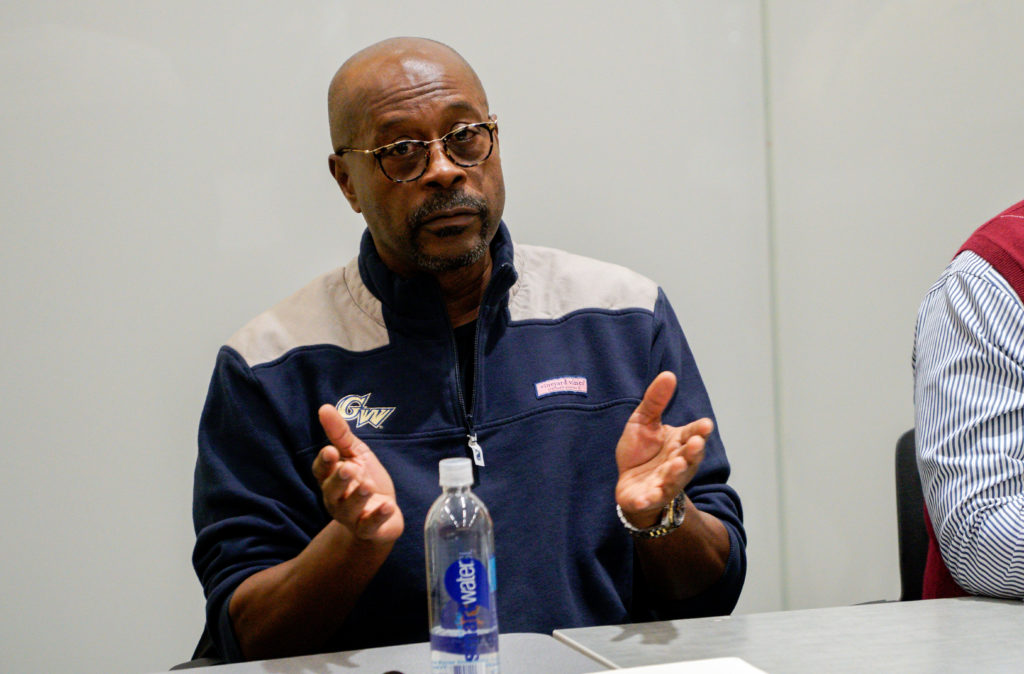GW Police Department officers and students joined together Friday evening for a conversation on interactions between students and police officers.
The discussion – titled “Together We Stand!” – drew approximately 20 students and six GWPD officials. Students anonymously submitted questions at the beginning of the event, which panelists – two top department officials and four officers – answered throughout the forum.
Khari Crooms, the freshman who organized the panel, said the event helped strengthen the GW community. Crooms said students should hold more panels with administrators to voice their concerns and offer insight.
“I felt that organizing this panel would serve as a way for us as students to not only get to know our campus officers on a more personal level, but it was a way make the GW community as a whole stronger,” Crooms said in an email.
Here are the key takeaways from the panel:
Addressing alerts
Darrell Darnell, the senior associate vice president for safety and security, opened the meeting with a discussion about a GW Alert sent to students Sept. 23 following an on-campus robbery. The alert described the suspects as “four black males, riding scooters,” which some students in attendance said was an example of black males being stereotyped and discriminated against on campus.
He said the University is legally required to send an alert to students after 13 types of crimes, like robberies, that present an ongoing threat to the campus community.
Darnell added that the department uses limited information from victims to inform the alerts, but the description of the suspects as “black males” was not useful when GWPD was looking for the suspects. He said an officer was able to identify the suspects based on the description of the four individuals riding scooters, not specifically their race, as the description of the actual robbery was “unusual” for a Sunday morning.
But Darnell said that the department is not perfect and can sometimes make mistakes.
“One of the things I would hope is that we can acknowledge our mistakes,” he said. “In an open community like GW, it’s about having a dialogue and listening with empathy.”
Student questions
Students submitted questions about how GWPD approaches cultural sensitivity and bridges the divide between students and police officers.
One student asked what the officers valued most in serving the GW community. Officers said they value engaging with young people and serving the student population.
“I enjoy that you guys are here,” Richard Tenhue, the assistant chief of operations, said. “You guys are active, here in the GW community. I’m here to serve you.”
Another student asked how the department addresses cultural sensitivity. Tenhue said the department is committed to treating individuals with respect, and the campus police academy and extensive training for officers involve discussions about cultural sensitivity.
“The more we can educate ourselves to cultural sensitivities, the more we can respect one another,” Tenhue said. “I’m committed to that.”
Eliminating stereotypes
The panel also highlighted how interactions between students and police could grow beyond reporting and responding to crimes. Darnell, the senior associate vice president for safety and security, said he wants GWPD to be more removed from patrolling residence halls because the practice perpetuates negative views toward officers.
“You guys are just having a good time and maybe doing things you aren’t supposed to be,” Darnell said. “That doesn’t always require a police response. That should be something the residence hall adviser should do.”
Freddy Ryle, a junior, spoke about interactions beyond the “stereotypical” student-police relationship and thanked one officer in attendance for interacting with him in the past.
“You speak to me every time you see me, and I appreciate that,” he said. “Imagine if everyone felt that way about a police officer on this campus.”
The student encouraged GWPD officers to perform a random act of kindness daily and to stay involved in students’ lives beyond negative interactions.
Darnell concluded the panel by encouraging students to engage in open discussions with the department when issues arise.
“Hold us accountable,” Darnell said. “I don’t have a problem with that, we are accountable to you all. I do not take it personally, or in a slanderous way.”





